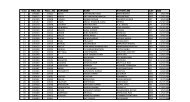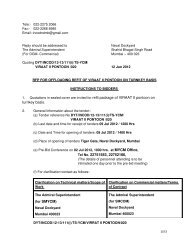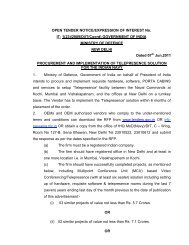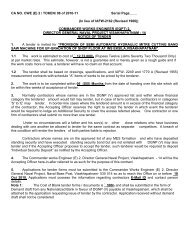deployment of the PLA Navy ships in the - Information Resource ...
deployment of the PLA Navy ships in the - Information Resource ...
deployment of the PLA Navy ships in the - Information Resource ...
You also want an ePaper? Increase the reach of your titles
YUMPU automatically turns print PDFs into web optimized ePapers that Google loves.
NAVAL DESPATCH<br />
FFFFFFFFFFFFFFFFFFF<br />
f<strong>in</strong>d<strong>in</strong>g <strong>the</strong> balance between efficiency, security and<br />
<strong>in</strong>fluence <strong>in</strong> networked comb<strong>in</strong>ed operations.<br />
Efficient networks require <strong>the</strong> free exchange <strong>of</strong><br />
<strong>in</strong>formation on <strong>the</strong>m. Mov<strong>in</strong>g <strong>in</strong>formation from one<br />
<strong>in</strong>dependent network to ano<strong>the</strong>r is like <strong>the</strong> ponderous<br />
movement <strong>of</strong> a tra<strong>in</strong> from one rail gauge to ano<strong>the</strong>r.<br />
The price for such efficiency, however, is not just<br />
technical cooperation <strong>in</strong> develop<strong>in</strong>g common data<br />
models and technical standards, but also deep<br />
political trust between co-operat<strong>in</strong>g partners. National<br />
security, however, is about protect<strong>in</strong>g vulnerable<br />
resources. <strong>Information</strong> release policies are specifically<br />
designed to be <strong>in</strong>efficient <strong>in</strong> order to prevent<br />
<strong>in</strong>advertent exchange. High levels <strong>of</strong> network<br />
efficiency will require a great deal <strong>of</strong> political and<br />
operational trust amongst partners. Similar levels <strong>of</strong><br />
co-operation are not found even <strong>in</strong> NATO’s alliance<br />
networks .<br />
Common Interoperability Challenges<br />
Language. Language difference across <strong>the</strong><br />
IOR nations is a challenge that needs to be addressed.<br />
Without a common language, naval forces cannot<br />
co-operate effectively. Two units with a common<br />
mission but without common language will have to<br />
divide <strong>the</strong> tasks between <strong>the</strong>m <strong>in</strong> a way that makes<br />
<strong>in</strong>teraction unnecessary. They must <strong>the</strong>n hope that<br />
noth<strong>in</strong>g and nobody will <strong>in</strong>terfere with <strong>the</strong> l<strong>in</strong>e <strong>of</strong><br />
division. However, no military operation can be safely<br />
built on such a premise. Any competent military<br />
opponent will seek <strong>the</strong>se divisions <strong>of</strong> responsibility and<br />
exploit <strong>the</strong>m. Therefore it would desirable for <strong>the</strong> IOR<br />
navies to master <strong>the</strong> English language. The better <strong>the</strong><br />
knowledge <strong>of</strong> English by <strong>the</strong> forces <strong>in</strong>volved <strong>the</strong> better<br />
<strong>the</strong> basis for co-operation. The deeper <strong>the</strong> key staff<br />
<strong>of</strong>ficers know this common language and <strong>the</strong> more<br />
familiar <strong>the</strong>y are with <strong>the</strong> different accents, nuances<br />
and dialects, <strong>the</strong> less scope for misunderstand<strong>in</strong>g.<br />
Procedures and Basic Formats. Common<br />
knowledge <strong>of</strong> language only creates <strong>the</strong> most basic<br />
foundation for co-operation. In itself, however, it does<br />
not remove <strong>the</strong> likelihood <strong>of</strong> misunderstand<strong>in</strong>g,<br />
friction, and accidents. In order to <strong>in</strong>crease <strong>the</strong><br />
probability <strong>of</strong> co-operation be<strong>in</strong>g smooth, all <strong>in</strong>volved<br />
sides will have to accept, absorb, and use, a common,<br />
standardised term<strong>in</strong>ology. This <strong>in</strong>cludes standardised<br />
order and report<strong>in</strong>g formats, communications<br />
procedures and forms, as well as similarities <strong>in</strong> staff<br />
structures and work<strong>in</strong>g and plann<strong>in</strong>g formats. The<br />
cooperat<strong>in</strong>g parties must also have an agreed normal<br />
division <strong>of</strong> responsibilities and procedures <strong>in</strong> situations<br />
that will occur <strong>in</strong> <strong>the</strong> field dur<strong>in</strong>g <strong>the</strong> operation: e.g.<br />
pass<strong>in</strong>g <strong>of</strong> each o<strong>the</strong>r's l<strong>in</strong>es dur<strong>in</strong>g underway<br />
replenishment. However, <strong>the</strong> silver l<strong>in</strong><strong>in</strong>g is that most<br />
<strong>of</strong> <strong>the</strong> countries have a standard NATO probe and <strong>the</strong><br />
procedures for fuell<strong>in</strong>g.<br />
Technological Interface. Common<br />
language and rout<strong>in</strong>e <strong>in</strong> us<strong>in</strong>g common procedures<br />
have to be backed-up by compatible technology. The<br />
key element <strong>in</strong> mak<strong>in</strong>g <strong>the</strong> common language and<br />
procedures effective is to have compatible<br />
communications equipment (and encryption<br />
systems) at <strong>the</strong> command levels where timely<br />
<strong>in</strong>formation must be available and direct co-ord<strong>in</strong>ation<br />
is essential. If comb<strong>in</strong>ed operations are likely to be<br />
<strong>in</strong>terwoven to a very high extent efficiency will also<br />
depend on <strong>the</strong> compatibility <strong>of</strong> <strong>the</strong> equipment and<br />
systems. At <strong>the</strong> low level, one could mention common<br />
standardised fitt<strong>in</strong>gs on equipment and common<br />
term<strong>in</strong>ology for spares. At <strong>the</strong> medium level, have<br />
common types <strong>of</strong> fuel and ammunition. At <strong>the</strong> high<br />
end <strong>of</strong> <strong>in</strong>teroperability forces are us<strong>in</strong>g very much <strong>the</strong><br />
same types <strong>of</strong> key equipment allow<strong>in</strong>g use <strong>of</strong> <strong>the</strong><br />
same spare parts and ma<strong>in</strong>tenance organisations.<br />
The equipment and <strong>the</strong> support <strong>of</strong> <strong>the</strong> larger<br />
participat<strong>in</strong>g states have dom<strong>in</strong>ated all efficient<br />
<strong>in</strong>ternational forces <strong>in</strong>volved <strong>in</strong> mult<strong>in</strong>ational<br />
operations throughout history and is likely be <strong>the</strong> case<br />
<strong>in</strong> future comb<strong>in</strong>ed operations <strong>of</strong> some duration and<br />
<strong>in</strong>tensity. The higher <strong>the</strong> level <strong>of</strong> <strong>in</strong>itial standardisation<br />
or at least compatibility between <strong>the</strong> naval assets, <strong>the</strong><br />
higher <strong>the</strong> degree <strong>of</strong> <strong>in</strong>teroperability. IOR navies must<br />
strive to obta<strong>in</strong> it.<br />
Cultures. Each nation possesses a unique<br />
identity, based on language, values, cultural identity,<br />
and social outlook. Navies are very much <strong>in</strong>fluenced<br />
by <strong>the</strong>ir national military experience and history, as<br />
well as <strong>the</strong> educational system, norms, social and<br />
political system, etc. <strong>of</strong> <strong>the</strong> society, <strong>the</strong> part <strong>of</strong> which it<br />
is. Differences between navies result<strong>in</strong>g from <strong>the</strong><br />
diverse national background can <strong>in</strong>fluence<br />
<strong>in</strong>teroperability to a very high degree. Even m<strong>in</strong>or<br />
factors can have considerable impact. Different<br />
cultures mean that naval forces vary <strong>in</strong> <strong>the</strong> way <strong>the</strong>y<br />
do even <strong>the</strong> simplest th<strong>in</strong>gs. They differ <strong>in</strong> <strong>the</strong> will to<br />
FFFFFFFFF<br />
FFFFFFFFF SEPTEMBER 2009<br />
11


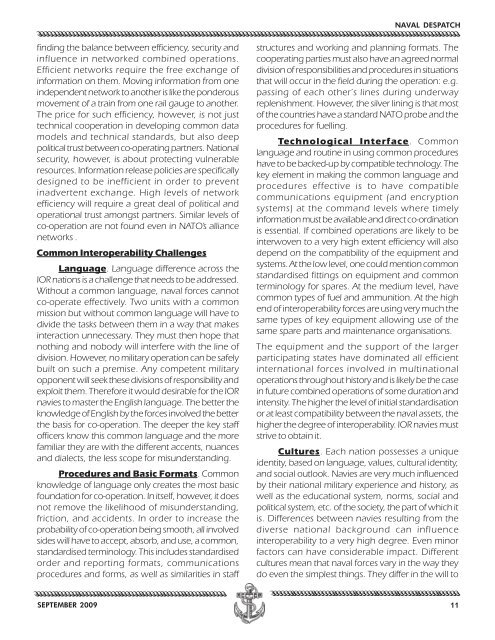
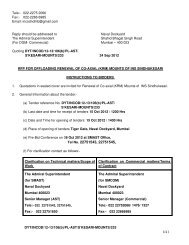
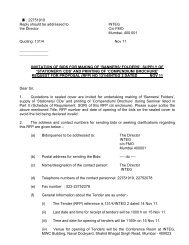
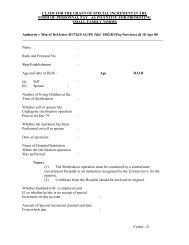
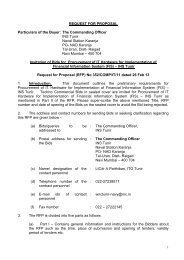
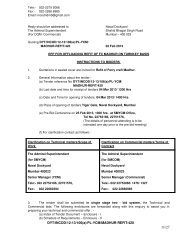
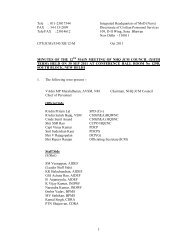
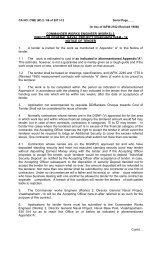

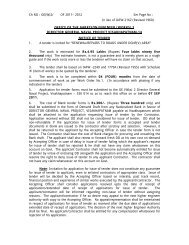
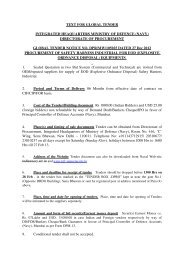
![DGNP[V] - Irfc-nausena.nic.in](https://img.yumpu.com/23509938/1/158x260/dgnpv-irfc-nausenanicin.jpg?quality=85)
